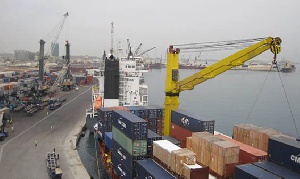 Government has developed a comprehensive roadmap to fully implement the trade facilitation agreement
Government has developed a comprehensive roadmap to fully implement the trade facilitation agreement
Government has been urged to prioritise implementation of the measures in the Trade Facilitation Agreement in the 2018 National Budget to position the country as a major continental trade hub within the next five years.
Ghana has signed on to the World Trade Organisation’s Trade Facilitation Agreement (TFA), which enjoins the country to put strategies in place to address the delays and cost associated with the clearance of goods from the ports.
A trade expert at the World Trade Centre Accra, Mr. Bright Awuye, presenting a ‘National Roadmap on Ghana’s Trade Facilitation’ to senior government officials and various private sector actors in Accra said: “It is prudent that domestic resources and donor support are mobilised to implement the trade facilitation measures to achieve the set targets by 2022.”
Government has developed a comprehensive roadmap to fully implement the trade facilitation agreement so as to ensure that within the next five years the country will be positioned to reduce the time spent in clearing goods at the ports to less than 48 hours.
The Roadmap is one of the main outcomes of the Empowerment Programme for National Trade Facilitation Committees, which is a technical support provided by UNCTAD since 2016. It is expected to be implemented from 2018 to 2022, and will serve as a guiding framework for implementing the WTO Trade Facilitation Agreement.
The purpose is to ensure that by the end of 2022, through improved efficiency and risk management, the trade facilitation reforms implemented in Ghana will decrease the time required for clearance of imports, exports and transit to 48 hours; reduce the cost of doing business (cross-border trade) by 40%; and place Ghana among the top 100 countries of the World Bank Doing Business Index- trading across borders.
Ghana has about 35 measures to implement under the WTO TFA between 2018 and 2022 to ensure early clearance of goods in order to improve the country’s ranking on the World Bank reports on the ease of doing business.
Mr. Awuye, who is also a member of the Ghana National Trade Facilitation Committee (NTFC) of the Ministry of Trade and Industry, explained that Article 21 of the WTO Trade Facilitation Agreement enjoins donors to support developing and least-developed countries (LDCs) to implement various measures.
Ghana, he said, needs to take the lead role in actively implementing some of the measures as is currently being done under the Single Window arrangement, to serve as a pull factor in attracting donor support from the competitive donor market.
“For this reason, measures which promise ‘quick wins’ such as reduction of roadblocks without compromising security on transit corridors; fostering pre-arrival processing and mainstreaming trade facilitation into National Development Planning Policy, among others, should gain traction in the 2018 National Budget currently being prepared,’’ he indicated.
He called for a concerted effort to consolidate the gains already made in implementing the National Single Window, and disclosed that the success of this roadmap lies in the ability of the public and the private sectors to work collaboratively in implementing the roadmap’s various activities.
Chief Director of the Ministry of Trade and Industry, Mr. Dawarnoba Beaka, revealed that government is passionate about trade facilitation as it is important in accelerating economic development.
He indicated that high transportation cost and burdensome documentation, among others, have rendered the country’s exports uncompetitive.
“The benefits of engaging in paperless trade are enormous, as this will enhance transparency and accountability, revenue collection and reduction in time and cost of doing businesses,” he said.
He urged members of the National Trade Facilitation Committee to work assiduously to ensure the full implementation of the roadmap, and called on the private sector to take an active interest in trade-related policies since they are the direct beneficiaries of such policies.